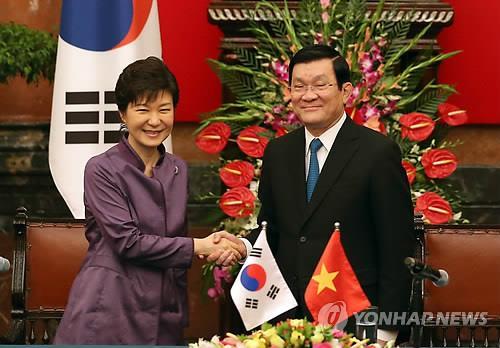S. Korea, Vietnam agree to conclude free trade deal next year

Yonhap 2013/09/09
S. Korea, Vietnam agree to conclude free trade deal next year
By Chang Jae-soon
HANOI, Sept. 9 (Yonhap) — South Korea and Vietnam agreed Monday to conclude a bilateral free trade agreement next year and cooperate closely for nuclear power development in the Southeast Asian nation.
South Korean President Park Geun-hye and Vietnamese President Truong Tan Sang reached the agreement during a summit in Hanoi, pledging to work together to triple trade volume between the two sides to reach US$70 billion by 2020.
"We agreed on accelerating negotiations to conclude a comprehensive, high-quality FTA in 2014," Park said during a joint news conference with Sang after the summit talks at Vietnam’s presidential palace.
It was the first time the two sides have set a target timeframe for a deal since they officially launched the trade negotiations last year. The sides have so far held two rounds of talks, and a third round is scheduled for October in Hanoi.
Trade volume between South Korea and Vietnam amounted to US$21.6 billion last year, a 44-fold rise from less than $500 million in 1992, when the two former battlefield foes established diplomatic relations.
Park also said the two sides agreed to continue to cooperate for nuclear power development in Vietnam based on a shared understanding that South Korea’s experiences in nuclear power development and technologies would contribute to fostering Vietnam’s nuclear power industry.
The agreement brightened the prospects of Korean firms winning nuclear power plant contracts.
Vietnam plans to build 10 nuclear reactors by 2030, and South Korea hopes to take part in the construction of two of them, producing more than 1,000 megawatts each. The two-reactor projects are worth about US$10 billion. Russia and Japan are also vying for participation.
South Korea and Vietnam launched a preliminary feasibility study for the project in June.
Vietnam also pledged to render cooperation and support for South Korean companies trying to take part in a series of energy and infrastructure projects, including a $3.6 billion project to build two, 1,000-megawatt, coal-powered thermal power plants in the Long Phu district in southern Vietnam.
Other plans include a $2.3 billion project to build two 600-megawatt thermal power plants in the Nghi Son economic zone in northern Vietnam and a project to build and operate an underground oil storage terminal in Dung Quat in southern Vietnam.
In return, South Korea promised an array of development aid projects for Vietnam, including one that calls for establishing a science technology research institute, known as V-KIST, modeled after the Korea Institute of Science and Technology (KIST).
Other aid projects include building a road linking the northern Vietnamese cities of Tan Van and Nhon Trach, joint research and development in parts industries and sharing South Korea’s expertise in logistics, agriculture and other sectors.
After the summit, seven cooperation agreements were signed, including those on aid projects.
Park’s state visit to Vietnam has been billed by officials as the kickoff of her "sales diplomacy" drive that calls for using diplomatic trips and meetings to promote South Korea’s economic interests so as to help Asia’s fourth-largest economy recover from a prolonged slump.
Park has put forward the slogan as a top priority in the second half of the year.
Park arrived in Hanoi on Saturday for a five-day visit, her third overseas trip as president. Vietnam is an unusual choice for one of the first overseas visits by a South Korean president, which officials said shows that Park is very much committed to the "sales diplomacy" campaign.
She visited the United States and China earlier this year.
Vietnam is also home to some 1,800 Korean firms, and the No. 1 recipient of South Korea’s official development aid.
On political and security issues, Park said the two leaders agreed that North Korea’s nuclear weapons development poses a threat to peace and stability in East Asia and beyond. They agreed that Pyongyang must abide by its international obligations and become a responsible member of the international community.
She also said that the Vietnamese leader expressed support for her "Korean Peninsula trust process" vision, her trademark policy on North Korea. It calls for exchanges and dialogue so as to build trust and reduce tensions across the heavily fortified border.
The two sides also agreed to deepen defense exchanges and cooperation.
Ahead of the summit, Park paid a visit to the mausoleum of late Vietnamese revolutionary leader Ho Chi Minh and presented a wreath, a symbolic gesture of reconciliation. Park’s late father — former President Chung-hee — sent troops to fight alongside the United States in the Vietnam War.
Later in the day, Park was to meet with other top Vietnamese leaders, such as Nguyen Phu Trong, the secretary general of the country’s Communist Party; Prime Minister Nguyen Tan Dung; and Parliamentary Speaker Nguyen Sinh Hung.
jschang@yna.co.kr
(END)





